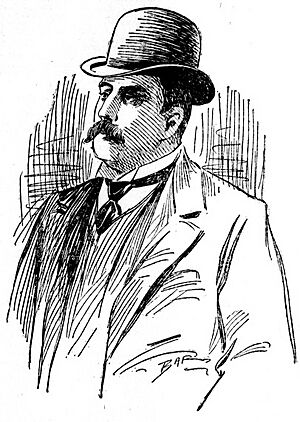Kick Kelly facts for kids
Quick facts for kids Kick Kelly |
|||
|---|---|---|---|
 |
|||
| Catcher/Manager/Umpire | |||
| Born: October 31, 1856 New York City |
|||
| Died: March 27, 1926 (aged 69) Malba, New York |
|||
|
|||
| debut | |||
| May 1, 1879, for the Syracuse Stars | |||
| Last appearance | |||
| August 7, 1879, for the Troy Trojans | |||
| MLB statistics | |||
| Batting average | .155 | ||
| Home runs | 0 | ||
| Runs batted in | 2 | ||
| Teams | |||
|
|||
| Career highlights and awards | |||
|
|||
John O. "Kick" Kelly (born October 31, 1856 – died March 27, 1926) was an American baseball player, manager, and umpire. He was also known by his nicknames "Honest John" and "Diamond John".
Kelly played a big role in how baseball umpiring developed. He helped start the idea of using more than one umpire in games during the 1880s. When he first stopped umpiring in 1888, he held the record for umpiring the most games in Major League Baseball. He worked 587 games. He later returned to umpire for a short time in 1897.
Contents
Kick Kelly's Baseball Career
Playing in the Major Leagues
Kick Kelly played only one season in the National League in 1879. He played for two different teams that year. First, he played ten games for the Syracuse Stars. Eight of those games were as a catcher.
After that, he played six more games with the Troy Trojans. In total, he played 16 games. He had a batting average of .155 and scored five runs.
Becoming an Umpire
After his time as a player, Kelly became a baseball umpire. He worked games in both the National League and the American Association. He started in the National League in 1882, umpiring 51 games.
Then, he moved to the American Association from 1883 to 1886. He returned to the National League in 1888. Being an umpire in the early days of baseball was very tough. Not many umpires lasted more than a few seasons. By the end of the 1885 season, Kelly had umpired more major league games than anyone else before him.
Highlights of His Umpiring
Kelly had some memorable moments as an umpire. He called two no-hitters, which means he was the umpire when a pitcher didn't allow any hits. The first no-hitter he called was on September 20, 1882. It was thrown by Larry Corcoran of the Chicago White Stockings.
The second no-hitter was on September 18, 1897. This one was thrown by Hall of Famer Cy Young. It was the first of three no-hitters in Young's amazing career.
Kelly's record of 587 career games as an umpire was later broken by Bob Ferguson in 1890. Kelly finished his umpiring career in 1897, having worked eight seasons and 626 games.
New Umpiring System
At one point, Kelly took a break from umpiring to manage the Louisville Colonels in 1887 and 1888. After the 1887 season, Kelly and fellow umpire John Gaffney worked together in the 15-game World's Championship Series. This series was between the National League champion Detroit Wolverines and the American Association champion St. Louis Browns.
They came up with a new system for umpires. One umpire would call balls and strikes from behind home plate. The other umpire would make calls on the bases. This new system was a big improvement. In 1946, Kelly was recognized by the Baseball Hall of Fame for his contributions to umpiring.
Managing a Team
Kick Kelly started his managing career in 1887 with the Louisville Colonels. He managed the team for the whole season. They had a record of 76 wins and 60 losses, finishing fourth in the American Association.
He also started the 1888 season as their manager. However, the team had a tough start with 10 wins and 29 losses. The team's owner decided to take over as manager. The team still finished in seventh place that year.
Kick Kelly's Boxing Career
Kelly also became a referee for championship boxing matches. He refereed a famous heavyweight title defense by Jim Corbett against Charley Mitchell on January 25, 1894.
He also refereed another heavyweight fight between Corbett and Tom Sharkey in 1898. Kelly also refereed the bout where Frank Erne won the world lightweight title from Kid Lavigne in 1899.
Later Life
Kick Kelly passed away in Malba, Queens, when he was 69 years old. He is buried at the Calvary Cemetery in Woodside, New York.
 | Calvin Brent |
 | Walter T. Bailey |
 | Martha Cassell Thompson |
 | Alberta Jeannette Cassell |

